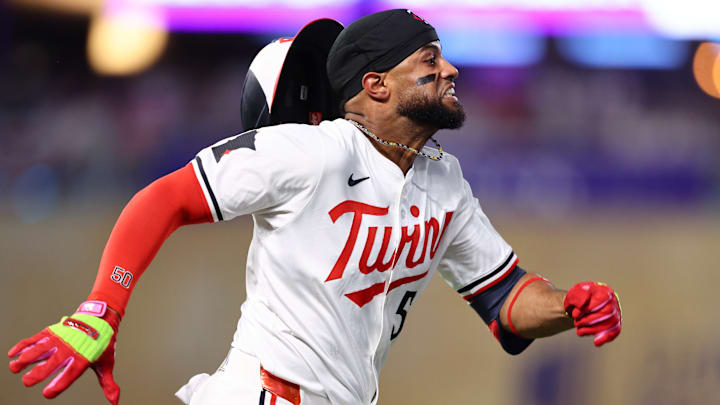Alex Kirilloff, 1B
Another player set for arbitration this year is Alex Kirilloff, but the prospects that he's back are far dimmer than Willi Castro's. Where one went to the All-Star Game this year, the other battled injuries and poor performance to box himself out of the picture.
Kirilloff was electric at the start of the season and was a triples machine, but that quickly fell off. More than his drop in production is his potentially negative standing in the clubhouse. After being demoted to Triple-A amid his offensive struggles, Kirilloff waited until that moment to reveal an injury that placed him on the IL instead.
Rocco Baldelli wasn't shy about how displeased he was with how things played out. That could be a major strike against Kirilloff, especially considering he didn't show much on the field to warrant the Twins bending over backward to keep him around.
What could ultimately work in his favor is how cheap the team might be able to settle arbitration. Minnesota also doesn't have a clear cut plan for first base, which also plays into his potential return. Kirilloff has almost no leverage, though, and it could be that he returns on a prove-it deal that hopefully works out for everyone.
Jorge Alcala, P
A surprise non-tender could be reliever Jorge Alcala. He's among the group of players who are up for arbitration this year and while he settled last year for less than $800k, he's estimated to be worth just shy of $2 million which is a little rich for Minnesota's blood.
The question is how badly did Alcala hurt his stock with how spectacularly he flamed out over the course of the team's meltdown. He was on the mound in Arlington when the Twins blew a lead against the Rangers that triggered the historic collapse, and while it's unfair to blame him for the mess that followed it's safe to say he didn't help make it better.
Alcala finished the year with a 3.24 ERA and 1.4 WAR, but he was brutal down the stretch. There was a stretch between early August and mid-September where he allowed seven homers in 14 appearances and was charged with 14 runs in 13 1/3 innings for a whopping 9.45 ERA.
The fact that he still finished with positive numbers is a testament to how solid he was earlier in the year, which is why the team might bring him back. His usage was a bit strange, though, and the fact that he was optioned to St. Paul for the final few games of the season over other pitchers who might have made more sense is also telling.
Carlos Santana, 1B
An annual tradition for the Twins is to sign a name-brand veteran who is past their prime but might still have something left in the tank. This season that was Carlos Santana, and while it took a bit for him to settle in he ended up being a key piece of the everyday lineup.
He was signed for his bat, but it was his glove that ended up providing the most value. There's a decent change he wins a Gold Glove for his work at first base, and he finished with perfectly average numbers at the plate.
This has all the markings of what happened with Michael A. Taylor and Donovan Solano last season. Both veterans were key contributors but neither was brought back this year thanks to a tight payroll. Santana was signed for just over $5 million with money that was freed up by salary dumping Jorge Polanco, and that price might be a little much for a team looking to keep things lean again this winter.
It makes sense for the Twins to bring him back, as he fills an obvious need at first base. Whether the team wants to pay him is another question, one that seems to have an answer rooted in how they might be able to move things around internally and save the money instead.
More Minnesota Twins news and rumors
